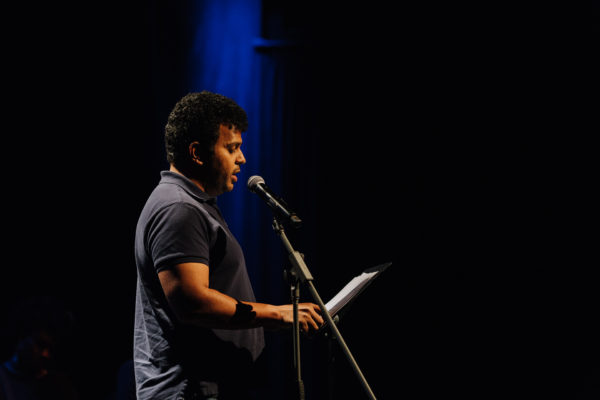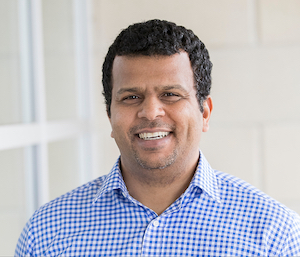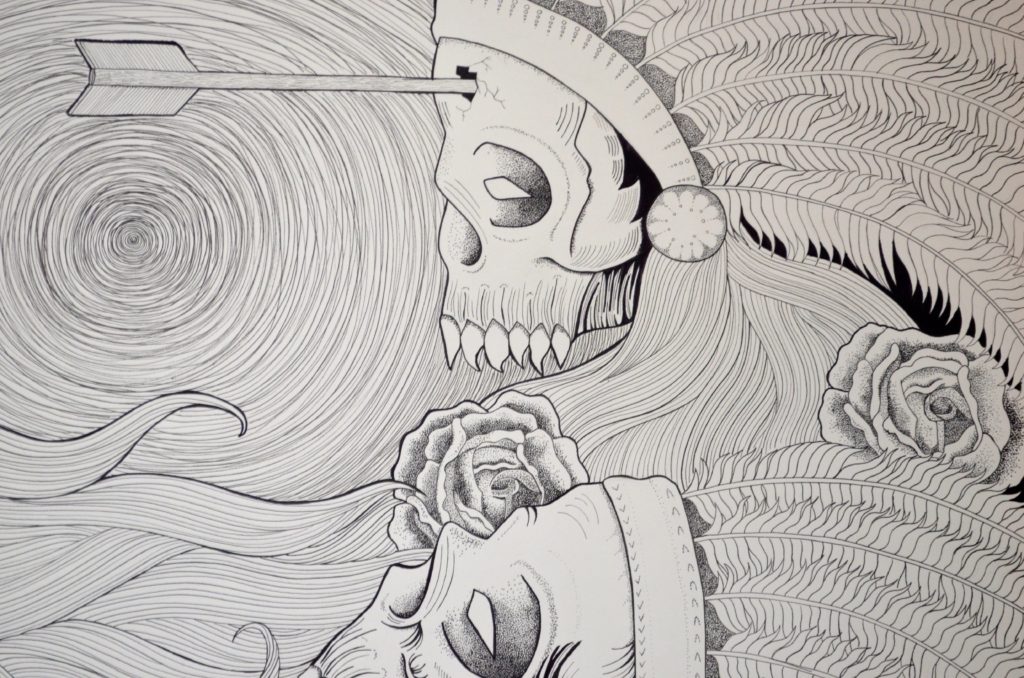français / Mi’kmaq

Buenos Aires is a dangerous city—or so I was told—and I want to get to my hotel before dark. My 15-hour flight is two hours late getting in and I’ve also had to endure an extra hour wait for my luggage—the sudden torrential downpour that greeted us on arrival proved too much for the ground staff at the Ministro Pistarini International Airport.
In the airport lobby, I spot an HSBC bank machine. I recognize the brand and, therefore, I trust it. I prod the machine for a thousand pesos, it dutifully spits out banknotes. Outside the terminal I look for a cab. Internet forums advise to only trust Radio Taxi and I notice one driving into a taxi stand. As I walk toward it, a man in ordinary clothes approaches and asks “English or Spanish ?” I opt to practice my broken Spanish. He gives me a thumbs up.
“¿Dónde vas ?” he says.
“Regal Pacific en Puerto Madero,”I say.
“Trescientos noventa y dos pesos.”
I nod and he points to the Radio Taxi. I sit in the back seat arranging my hand luggage while he crams my other bags into the trunk. He pokes his head through the front passenger window.
“Señor, trescientos noventa y dos pesos, por favor.”
“Bueno,” I respond.
“Señor, tenés que pagar ahora.”
I have to pay now ? I reach in my pocket and feel four of the banknotes I just withdrew and hand them to him. Meanwhile, my camera is slipping out of my backpack. I turn to adjust it.
“Señor,” he says, handing me back money. “Trescientos noventa y dos pesos. Esto es cuarenta.”
I apologize and take the cash. The ATM must have dispensed tens. I reach for another four banknotes and this time I inspect them. Definitely hundreds. He’s happy, thanks me and signals for the driver to proceed.
Confused, as we drive away, I take stock of the money I have left : two one-hundred peso notes and four tens. I’ve been duped.
¡Che, bienvenido a Buenos Aires !
Alejo, an Argentinian who helped me with my Spanish over Skype, told me to be vigilant because as a gringo, I would be a target of scams. I remember being confused : me, a gringo ? I thought the term referred to white tourists in Latin America. It was Alejo’s polite way of saying extranjero—foreigner.
I’ve been a foreigner everywhere I’ve lived and this makes it that much harder to answer the question “where are you from ?”. I sat next to a Sudanese lady on the plane from Toronto to Santiago who was surprised I could speak Arabic with a hint of her dialect. She summed up my predicament succinctly, but still incompletely : “So, you’re a Kenyan of Yemeni origin, living in New Brunswick, who grew up in Sudan, Yemen and Dubai and is now off to Buenos Aires ?”
As a tourist, the etiquette that deems the question impolite in some corners of the world dissipates, and the question becomes a vital initiator of dialogue. In answering, I alternate between “Canada” and “Kenya”—my two best candidate answers. But I feel disingenuous about both answers because they seem inadequate, and “Kenyan-Canadian” is not a place one can be from.
I’ve lived in New Brunswick for over twenty years. I feel at home in Fredericton. When I once visited Lunenburg, Nova Scotia, a friend chastised me for trying to sound exotic by “claiming” to be from Kenya when, really, I was from the province next door. But when I say I am from “Canada”, I sense that it’s an unsatisfying answer. That does not explain your accent, the thought goes, and even less, the way you look.
Although I only lived there for ten disjointed years, I was born in Kenya, I speak fluent Swahili and I visit the country often. But outside of the two main cities along the coast—which is to say, most of Kenya—, I’m frequently asked where I am from.
People take liberties with my identity. In the hustle and bustle of Buenos Aires’ Florida Street the next day, I edge my way through the crowd in the boisterous pedestrian street lined with tango dancers, vendors and panhandlers, all set to occasional sounds of the mournful bandoneon. A man standing in front of a store chants “Cambio… Cambio… Dólares, Cambio.” He asks if I want to change “reales”. Reales ?
A few days later, checking out of a hostel in Patagonia, I notice a display of banknotes from everywhere. Instinctively, I look for my currencies and find a Canadian five-dollar bill and an Emirati five-dirham note. As I scan for Kenyan shillings, I spot a Brazilian ten-real note. So that’s what that was.
The money-changer is not the only one to make this error. In Caminito, a Brazilian tourist asks me, in Portuguese, to take pictures of him with three different cameras. I tell him I don’t speak Portuguese.
“So, then, where are you from ?”
“Canada,” I choose this time.
“Oh ! I thought you were Brazilian…Toronto ?”
“No, further east.” Abroad, I’ve had limited luck describing New Brunswick—the few times the province was recognized were, for me, cause for celebration.
He gives me his devices and maintains the same static smile for all three shots.
My friend, Subhasish, arrives on my third day in Buenos Aires. I am giving him a tour of what I’ve discovered of the city when a short, burly man approaches him, “Hey India, I’m from Peru…”. We walk on puzzled about where he was going with that. Subhasish is from India, so the man at least got that part right.
As we walk back to the hotel, on a side-street, a hippie sitting on a step, hands pressed together, bows his head and tells Subhasish, “namaste”. This is not the only time we hear this. In the middle of our multi-day trek through Torres del Paine in Chile, a hiker comes from the other direction, and in stark contrast to the anglicized choruses we hear of Buen dias and Holas, raises one hand and bids Subhasish “namaste”.
I look at Subhasish and I think about how nice it must be to be so clearly from somewhere ; for people to be able to look at you and listen to you and accurately pinpoint where on the map you originate.
Pertinent as it is, I sense Subhasish isn’t amused by the pigeonholing. For him too, his Indian-ness doesn’t tell the full story. He identifies strongly with Seattle and has lived longer in North America than in India. Nonetheless, while I am with Subhasish, it is sometimes assumed I am Indian as well.
In Buenos Aires we meet Fernando, a jovial taxi driver proud of being able to speak serviceable English he acquired working in the tourist industry in Spain.
“You guys are from Bangladesh !” He asserts.
Stunned by this, I express amazement which Fernando unfortunately mistakes for confirmation. Subhasish is an Indian Bengali, so Fernando has a remarkably good reading of his ethnicity. After several attempts it is getting awkward trying to correct Fernando so we accept our ascribed Bangladeshi nationalities and entertain questions about Bangladesh.
I tell Fernando about my 400 peso swindle at the airport. He laughs.
“I’ll take you to the airport for two hundred and fifty pesos !” he says. “You’ll only have to pay once !” he adds as he continues laughing like it’s the funniest joke he has heard all week.
A day before we leave, Subhasish takes a stroll down Florida Street and returns to tell me he bumped into the Peruvian again who this time managed to finish his sentence : “Hey India, I’m from Peru,” then pointing in the general direction of a restaurant, “There’s a good steakhouse over there.” A poorly aimed recommendation considering that Subhasish, for cultural reasons, doesn’t eat beef.
Fernando is late picking us up at the hotel, but we’re not concerned because we had planned in a buffer for a city tour before heading to the airport. He stops near Casa Rosada, parks in an isolated stretch of the street and turns off the car.
“That’s Casa Rosada. I’ll wait here with your luggage.”
Oldest trick in the book. We’re in Buenos Aires and we’re not supposed to trust anyone—especially not cab drivers. But Fernando, being nothing but warm and friendly, has given us no reason to doubt him. We’re torn but we take the chance. Still, we carry our passports with us.
When we return we’re relieved that our judgment of his character was correct. He takes us to San Telmo’s feria where, under the scorching sun, we haggle with street vendors for last-minute souvenirs.
On the drive to the airport, Fernando continues asking us questions about Bangladesh. I deflect them to Subhasish who knows far more about his Bengali neighbours than I do. Not wanting to lie, he crafts his answers to be as noncommittal as possible.
We find ourselves in a bind when Fernando asks, “How long does it take to fly back to Bangladesh ?”
Subhasish looks at me for help. I grin. You’re on your own there, buddy.
“Actually, I’m going to the U.S.” he answers.
The conversation gets diverted to the IT industry in the U.S.A. and how rich we must be. True to his word, we end up paying Fernando only once—and he doesn’t even count the money.
Upon arrival in Fredericton, my luggage is delayed because Pearson is recovering from the last snow storm. I get into a cab and after some conversation, the driver asks, “So where are you from anyways ?” I look at the high snow banks we are whizzing by and decide to try something new with my answer this time. “I just got back from Buenos Aires.” I tell him, “It was thirty-five degrees yesterday.”
Muhammad Al-Digeil
Published in No 17. Creating Community




